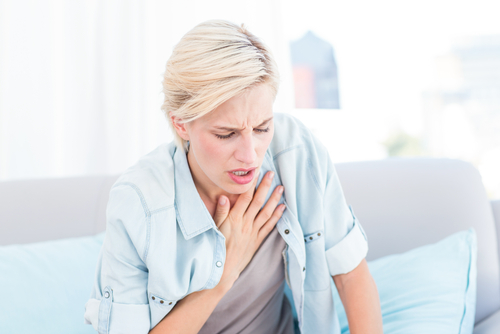Shortness of breath (dyspnea) is often described as an intense tightening in the chest, air hunger or a feeling of suffocation.
Very strenuous exercise, extreme temperatures, massive obesity and high altitude all can cause shortness of breath in a healthy person. Outside of these examples, shortness of breath is likely a sign of a medical problem.
If you have unexplained shortness of breath, especially if it comes on suddenly and is severe, see your doctor as soon as possible.
Causes
Most cases of shortness of breath are due to heart or lung conditions. Your heart and lungs are involved in transporting oxygen to your tissues and removing carbon dioxide, and problems with either of these processes affect your breathing.
Shortness of breath that comes on suddenly (called acute) has a limited number of causes, including:
- Asthma (bronchospasm)
- Carbon monoxide poisoning
- Cardiac tamponade (excess fluid around the heart)
- Hiatal hernia
- Heart failure
- Low blood pressure (hypotension)
- Pulmonary embolism (blood clot in an artery in the lung)
- Pneumothorax (collapsed lung)
- Pneumonia (pulmonary infection)
- Sudden blood loss
- Upper airway obstruction (blockage in the breathing passage)
In the case of shortness of breath that has lasted for weeks or longer (chronic dyspnea), the condition is most often due to:
- Asthma
- COPD (chronic obstructive pulmonary disease)
- Deconditioning
- Heart dysfunction
- Interstitial lung disease
- Obesity
A number of other health conditions also can make it hard to get enough air. These include:
Lung problems
- Croup (respiratory infection in young children)
- Lung cancer
- Pleurisy (inflammation of the membrane lining the chest)
- Pulmonary edema (excess fluid in the lungs)
- (scarred and damaged lungs)
- Pulmonary hypertension (high blood pressure within the lungs’ blood vessels)
- Sarcoidosis (collections of inflammatory cells in the body)
- Tuberculosis
Heart problems
- Cardiomyopathy (problem with the heart muscle)
- Heart arrhythmias (rhythm problems)
- Heart failure
- Pericarditis (swelling of the membrane surrounding the heart)
Other problems
- Anemia
- Broken ribs
- Choking
- Epiglottitis (swelling of part of the windpipe)
- Foreign object inhaled
- Generalized anxiety disorder
- Guillain-Barre syndrome (a disorder in which the body’s immune system attacks part of the peripheral nervous system)
- Myasthenia gravis (condition causing muscle weakness)
When to see a doctor
Seek emergency medical care
Call 911 or have someone drive you to the emergency room if you experience severe shortness of breath that comes on suddenly and affects your ability to function. Seek emergency medical care if your shortness of breath is accompanied by chest pain, fainting or nausea — as these may be signs of a heart attack or pulmonary embolism.
Make a doctor’s appointment
Make an appointment with your doctor if your shortness of breath is accompanied by:
- Swelling in your feet and ankles
- Trouble breathing when you lie flat
- High fever, chills and cough
- Wheezing
- Worsening of pre-existing shortness of breath
Self-care
To help keep chronic shortness of breath from getting worse:
- Stop smoking. Once you’re tobacco-free, your risks of heart and lung disease and cancer begin to drop — even if you’ve been smoking for years.
- Avoid exposure to pollutants. As much as possible, avoid breathing allergens and environmental toxins.
- Lose weight if you are overweight.
- Take care of yourself. If you have an underlying medical condition, take care of it.
- Have an action plan. Discuss with your doctor what to do if your symptoms become worse.
- Keep elevation in mind. Avoid exertion at elevations higher than 5,000 feet (1,524 meters).
- Regularly check your equipment. If you rely on supplemental oxygen, be sure your supply is adequate and the equipment works properly.


